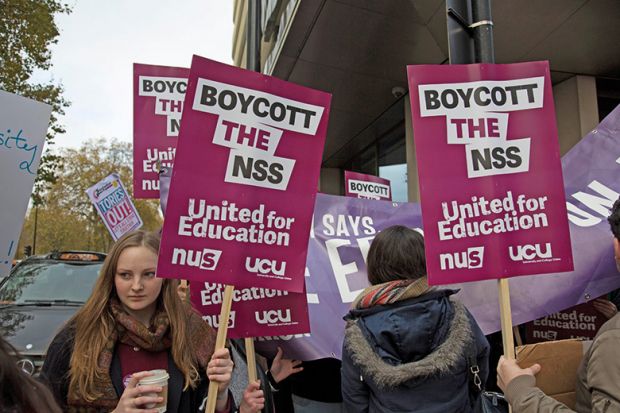The results of a multimillion-pound three-month campaign to get final-year undergraduates to fill in the National Student Survey (NSS) were revealed yesterday morning. Those running the campaign must be bitterly disappointed to see their efforts thwarted: 12 universities failed to reach the response threshold necessary to have their data published, with many response rates dropping by more than 20 per cent compared with last year.
According to the National Union of Students, more than 16,000 final-year students took part in local boycotts of the survey to show that they aren’t happy with the direction in which our higher education system is heading.
In an article for Times Higher Education, the University of Exeter’s Andrew McRae said that he felt “sorry for the students at those 12 unlisted universities who completed the survey. No, actually I feel bloody angry on their behalf.”
Don’t be sorry, Andrew, but, yes, be angry. Be angry at the government reforms that will change the face of higher education in this country in ways that don’t seem to benefit anyone.
Acting like the NSS was the best thing to happen to education since Watt’s photocopying press does no one any favours. We can’t look at the NSS in isolation in terms of what has been happening to higher education over the past decade. The sector landscape has moved a lot since the NSS was introduced in 2005 and it was certainly never intended to be linked to funding decisions. The higher education reforms threw in a curveball when they included the survey as a metric in the teaching excellence framework (TEF), thereby linking it to rising tuition fees.
Using the NSS to help rank institutions on their teaching excellence is misguided at best: the Royal Statistical Society (RSS) said that it was “not aware of any statistical association between student satisfaction as measured by the NSS and teaching quality”. And if the RSS doesn’t know about stats then I’m not sure who does. Overall, its take on the NSS is pretty scathing – saying that, overall, NSS scores, let alone subject ones, are useless in discriminating between universities and that many programmes are “dumbed down” so that they result in higher scores.
NSS 2017: view the overall satisfaction results
I’m baffled that fans of the NSS are not keener to protect this seemingly precious data source from being rendered useless by the TEF. The link between the TEF and tuition fees means that even more gaming, data manipulation and questionable campaigning will happen, with universities cutting corners and opening a shiny new gym or building around January time when students start getting asked to fill in the NSS. What use is the data for teaching and learning then?
With university leaders chasing the (baby) carrot of inflationary fee rises, the data become even more skewed. Goodhart’s Law expresses this phenomenon neatly: “when a measure becomes a target, it ceases to be a good measure”. I was hoping that academics would be more astute in the pursuit of truth and robust data.
Boycotting the NSS hasn’t denied students a voice, it has leveraged it. Students said no to a variety of incentives to encourage them to fill in the survey, from petting zoos and free pizza, to Amazon vouchers, iPads, charity donations, and a boat ride with the vice-chancellor (I won’t name the university where this idea was floated) – all while being warned to give a thumbs up to their courses, or see their graduate prospects affected.
Instead of having their views manipulated, students made themselves clear: they will not be complicit in rising fees according to the government’s meaningless rankings. This is what students holding their institutions and government to account looks like.
The NSS boycott did not overshadow the publication of data, but it does put a spotlight on the harmful changes the sector is going through. And it “worked” before the results even came out: the news was recorded in Hansard and mentioned in the lengthy debates in the House of Lords that scrutinised the Higher Education and Research Bill. The campaigning has forced a delay on introducing the link between TEF rankings and fees until 2020 and an independent review of the TEF.
Many in the sector raised alarm bells about the proposed use of the NSS in the TEF, but only students had the courage to follow through with action. We all have them to thank for standing up to defend education from another wave of marketisation.
Students have wielded the power of collective action and engaged in what could be a technical topic. Their choice to boycott the NSS opened up conversations about how quality can be improved, as well as alternative ways of gathering meaningful feedback, through course representatives and advocacy structures.
Thousands of students walked away from a framework purportedly putting their voice “at the heart of the system”, and they have voiced their concerns loud and clear. They showed that for students, the TEF is not a success story. It’s time for a new chapter.
Sorana Vieru was vice-president (higher education) of the National Union of Students during the NSS boycott campaign.
Register to continue
Why register?
- Registration is free and only takes a moment
- Once registered, you can read 3 articles a month
- Sign up for our newsletter
Subscribe
Or subscribe for unlimited access to:
- Unlimited access to news, views, insights & reviews
- Digital editions
- Digital access to THE’s university and college rankings analysis
Already registered or a current subscriber? Login






